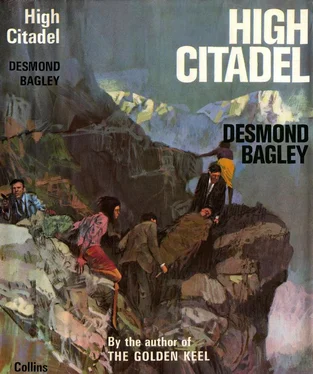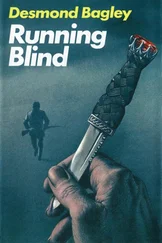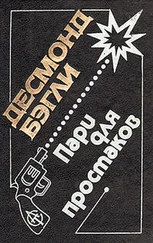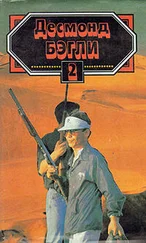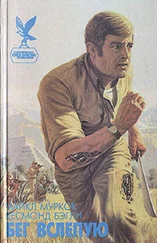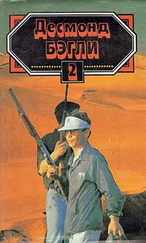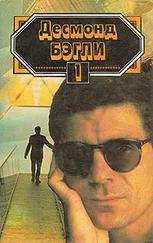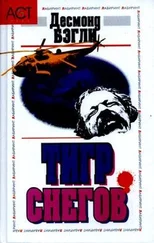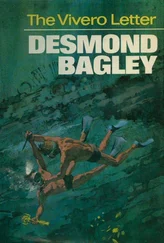‘Seven hundred feet, maybe,’ said Rohde.
‘Yes, we slipped about two hundred feet by coming back.’ Forester yawned. ‘Christ, it’s good to be out of the wind; I feel a good hundred per cent warmer — which brings me up to freezing-point.’ He pulled the jacket closer about him and regarded Rohde through half-closed eyes. Rohde was looking vacantly at the flaring Primus, his eyes glazed with fatigue.
Thus they lay in their ice shelter while the wind howled about them and flurries of driven snow eddied in small whirlpools in that haven of quiet.
Rohde dreamed.
He dreamed, curiously enough, that he was asleep — asleep in a vast feather bed into which he sank with voluptuous enjoyment. The bed enfolded him in soft comfort, seeming to support his tired body and to let him sink at the same time. Both he and the bed were falling slowly into a great chasm, drifting down and down and down, and suddenly he knew to his horror that this was the comfort of death and that when he reached the bottom of the pit he would die.
Frantically he struggled to get up, but the bed would not let him go and held him back in cloying folds and he heard a quiet maniacal tittering of high-pitched voices laughing at him. He discovered that his hand held a long, sharp knife and he stabbed at the bed with repeated plunges of his arm, ripping the fabric and releasing a fountain of feathers which whirled in the air before his eyes.
He started and screamed and opened his eyes. The scream came out as a dismal croak and he saw that the feathers were snowflakes dancing in the wind and beyond was the wilderness of the glacier. He was benumbed with the cold and he knew that if he slept he would not wake again.
There was something strange about the scene that he could not place and he forced himself to analyse what it was, and suddenly he knew — the wind had dropped. He got up stiffly and with difficulty and looked at the sky; the mist was clearing rapidly and through the dissipating wreaths he saw a faint patch of blue sky.
He turned to Forester who was lying prostrate, his head on one side and his cheek touching the ice, and wondered if he was dead. He leaned over him and shook him and Forester’s head flopped down on to his chest. ‘Wake up,’ said Rohde, the words coming rustily to his throat. ‘Wake up — come on, wake up.’
He took Forester by the shoulder and shook him and Forester’s head lolled about, almost as though his neck was broken. Rohde seized his wrist and felt for the pulse; there was a faint fluttering beneath the cold skin and he knew that Forester was still alive — but only just.
The Primus stove was empty — he had fallen asleep with it still burning — but there was a drain of kerosene left in the bottle. He poured it into the Primus and heated some water with which he bathed Forester’s head, hoping that the warmth would penetrate somehow and unfreeze his brain. After a while Forester stirred weakly and mumbled something incoherently.
Rohde slapped his face. ‘Wake up; you cannot give in now.’ He dragged Forester to his feet and he promptly collapsed. Again Rohde hauled him up and supported him. ‘You must walk,’ he said. ‘You must not sleep.’ He felt in his pocket and found one last coca quid which he forced into Forester’s mouth. ‘Chew,’ he shouted. ‘Chew and walk.’
Gradually Forester came round — never fully conscious but able to use his legs in an automatic manner, and Rohde walked him to and fro in an effort to get the blood circulating again. He talked all the time, not because he thought Forester could understand him, but to break the deathly silence that held the mountain now that the wind had gone. ‘Two hours to nightfall,’ he said. ‘It will be dark in two hours. We must get to the top before then — long before then. Here, stand still while I fasten the rope.’
Forester obediently stood still, swaying slightly on his feet, and Rohde fastened the rope around his waist. ‘Can you follow me? Can you?’
Forester nodded slowly, his eyes half open.
‘Good,’ said Rohde. ‘Then come on.’
He led the way out of the glacier and on to the mountain slopes. The mist had now gone and he could see right to the top of the pass, and it seemed but a step away — a long step. Below, there was an unbroken sea of white cloud, illumined by the late afternoon sun into a blinding glare. It seemed solid and firm enough to walk on.
He looked at the snow slopes ahead and immediately saw what they had missed in the darkness of the blizzard — a definite ridge running right to the top of the pass. The snow cover would be thin there and would make for easy travel. He twitched on the rope and plunged forward, then glanced back at Forester to see how he was doing.
Forester was in the middle of a cold nightmare. He had been so warm, so cosily and beautiful warm, until Rohde had so rudely brought him back to the mountains. What the devil was the matter with the guy? Why couldn’t he let a man sleep when he wanted to instead of pulling him up a mountain? But Rohde was a good joe, so he’d do what he said — but why was he doing it? Why was he on this mountain?
He tried to think but the reason eluded him. He dimly remembered a fall over a cliff and that this guy Rohde had saved his life. Hell, that was enough, wasn’t it? If a guy saves your life he was entitled to push you around a little afterwards. He didn’t know what he wanted, but he was with him all the way.
And so Forester shambled on, not knowing where or why, but content to follow where Rohde led. He kept falling because his legs were rubbery and he could not make them do precisely what he wanted, and every time he fell Rohde would return the length of the rope and help him to his feet. Once he started to slide and Rohde almost lost his balance and they both nearly tumbled down the slope, but Rohde managed to dig his heels into the snow and so stopped them.
Although Rohde’s stiff leg impeded him, Forester impeded him more. But even so they made good time and the top of the pass came nearer and nearer. There was only two hundred feet of altitude to make when Forester collapsed for the last time. Rohde went back along the rope but Forester could not stand. Cold and exhaustion had done their work in sapping the life energy from a strong man, and he lay in the snow unable to move.
A glimmer of intelligence returned to him and he peered at Rohde through red-rimmed eyes. He swallowed painfully and whispered, ‘Leave me, Miguel; I can’t make it. You’ve got to get over the pass.’
Rohde stared down at him in silence.
Forester croaked, ‘Goddam it — get the hell out of here.’ Although his voice was almost inaudible it was as loud as he could shout and the violence of the effort was too much for him and he relapsed into unconsciousness.
Still in silence Rohde bent down and gathered Forester into his arms. It was very difficult to lift him on to his shoulder in a fireman’s lift — there was the steepness of the slope, his stiff leg and his general weakness — but he managed it and, staggering a little under the weight, he put one foot in front of the other.
And then the other.
And so on up the mountain. The thin air wheezed in his throat and the muscles of his thighs cracked under the strain. His stiff leg did not hurt but it was a hindrance because he had to swing it awkwardly sideways in an arc in order to take a step. But it was beautifully firm when he took the weight on it. Forester’s arms swung limply, tapping against the backs of his legs with every movement and this irritated him for a while until he no longer felt the tapping. Until he no longer felt anything at all.
His body was dead and it was only a bright hot spark of will burning in his mind that kept him going. He looked dispassionately at this flame of will, urging it to burn brighter when it flickered and screening out all else that would quench it. He did not see the snow or the sky or the crags and peaks which flanked him. He saw nothing at all, just a haze of darkness shot with tiny sparks of light flaring inside his eyeballs.
Читать дальше
Конец ознакомительного отрывка
Купить книгу
